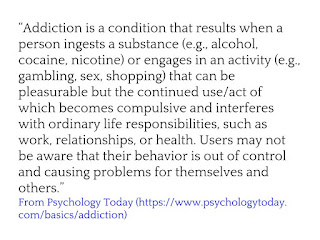I suppose a good starting point would be to remind ourselves what addiction is, and according to Psychology Today, it is the condition that results when a person ingests a substance or engages in an activity that can be pleasurable, but the continued act becomes compulsive and interferes with ordinary life responsibilities. A huge topic and problem, but I think I will narrow down to look at a problem that is surfacing more and more at schools - gaming & computer dependency. It seems to be a real problem that is becoming more pronounced and the tip of the iceberg is showing rather than the whole problem. I suppose that the first symptoms we see are the usual ones of tired students who skip class and are procrastinators. Now that in itself is a symptom that could apply to lots of problems and it is not until we delve deeper that we find the real problem.

The problem of addiction could well stem back to the style of life and societal pressures. We definitely live in an "instant society where self gratification is a fact of life". And this is part of the problem. Computer use allows us to be anywhere and anyone all at the click of a button. The instant gratification that goes with this tends to feed the pleasure centres of our brain - we get a dopamine surge. It's a simple action reward loop that feeds the addiction - I apologise for simplifying this extremely complex process, but for the sake of understanding I will continue. The child/teen then associates the action with the reward and each subsequent act deepens the physical response as a positive action. In simple terms, I think I can understand why they continue even though they are told it's a bad thing. We provide the negatives but the gaming wins by providing the dopamine and the feeling of pleasure. This is why it is hard for teens to break the cycle.
This immediate response compares favourably with the more mundane activities that come with student life, particularly learning. As a teacher, and I'm sure it's the same with parents, I get the comment that "I am bored" or "it's boring" as a response to why they are slow getting started or completing tasks. As I have mentioned previously, teens are yet to fully master the skills that control their actions and this allows this sort of addiction to flourish. The push for the moment rather than the delayed gratification is a learnt skill and many teens do not have the brain function and confidence to do this. And the younger the teen, the greater the problem, this is why many of the bad habits and addiction begins at an early age. But the problem doesn't really become a huge one until the stakes become higher in the senior school, and suddenly the addiction comes into the light.
Learning is a slow process that gradually builds upon the information and skills we gather, and more importantly the response for doing well is not immediate. But I think this is something that could easily be covered in a future blog.


No comments:
Post a Comment